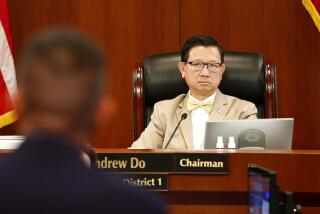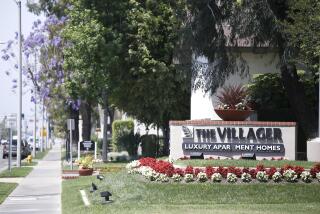Fannie Mae exec fired amid kickback scandal
Fannie Mae has fired the executive who headed its Irvine office amid a federal investigation into alleged kickbacks from real estate brokers.
One former employee of the home-finance giant has been indicted on charges of soliciting illegal payments from a broker, and another former worker has alleged that such conduct was common at the office. Federal investigators are trying to determine whether the alleged corruption extended to other employees, according to two people with knowledge of the probe.
James Tiegen, a vice president who oversaw Irvine and other regional offices where foreclosed properties are sold, was not suspected of criminal behavior, according to two people familiar with his departure. The people were not authorized to comment publicly and spoke on condition of anonymity; one said Tiegen was fired for “performance issues.”
The Times attempted to contact Tiegen, who lives in Coto de Caza, by phone and electronic messages starting last week but could not reach him. His phone line at the Irvine office was disconnected, and employees there said they had no forwarding address for him.
Fannie Mae officials said they aren’t allowed to comment on personnel and legal matters. But the taxpayer-owned company, which was bailed out during the financial crisis, said in a statement that it does not tolerate wrongdoing, and has “controls and procedures in place in order to combat fraud.”
“When we determine that our controls can be strengthened further, we implement changes,” the statement said. “For example, we have changed our property assignment process so that our sales associates will not make assignments to brokers, reducing the potential for conflicts of interest.”
The procedural overhaul is intended to curtail the likelihood of kickback demands by having a Fannie Mae squad in Dallas assign listings of foreclosed properties to the brokers, who earn commissions by selling them.
The assignments previously had been handled by foreclosure specialists in the regional offices, including more than 50 who worked in the high-rise near John Wayne Airport where Tiegen had overseen operations. The specialists will continue managing foreclosed properties and approving sales but will no longer assign listings.
One former specialist, Armando Granillo of Huntington Beach, was arrested March 5 in an early-morning sting near MacArthur Park in Los Angeles.
Court documents said he was clutching $11,200 in cash as he stood in a Starbucks parking lot — money he allegedly had demanded in return for providing foreclosure listings to a broker, who alerted federal authorities. Granillo has pleaded not guilty and is free on bail pending trial, scheduled for August.
An affidavit filed in federal court said Granillo had told the broker that kicking back a slice of commissions on foreclosed properties was “a natural part of business” at Fannie Mae.
Another former foreclosure specialist in Irvine, Cecelia Carter, also described the kickbacks as widespread.
Carter alleged in a lawsuit last month that she was fired for trying to expose the involvement of several employees, including Granillo, in such schemes. One of her attorneys, Peter Whelan of Washington, said Fannie Mae had not yet replied to the suit.
The investigation continues, headed by the U.S. attorney in Los Angeles, working with agents from the inspector general of the Federal Housing Finance Agency, according to two sources who requested anonymity because they were not authorized to speak publicly about the investigation.
The accusations, reported two weeks ago by The Times, touched off a flurry of concerned memos to the staff from Fannie Mae officials, including Chief Executive Timothy J. Mayopoulos and Brandon Lawler, director of foreclosure sales in Dallas, according to Fannie Mae employees and lawyers familiar with the case.
One memo obtained by The Times, from Fannie Mae Chief Compliance Officer Nancy Jardini, warned employees that the company “defines fraud as an intentional act or omission that affects, or could affect, Fannie Mae, and that is done for the purpose of securing any improper gain or benefit for Fannie Mae or anyone else.”
Carter said Fannie Mae officials altered findings to make themselves look better in reports that ultimately were passed up to Congress. She said she began alerting Tiegen to kickbacks as far back as 2009, and that she identified Granillo as involved in 2011.
An internal Fannie Mae investigation said it could find no evidence to support her allegations.







